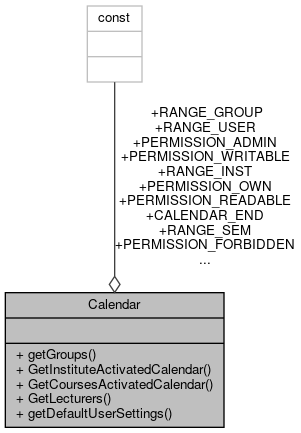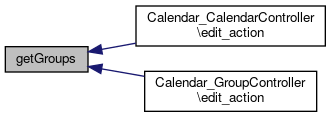◆ GetCoursesActivatedCalendar()
| static GetCoursesActivatedCalendar |
( |
|
$user_id | ) |
|
|
static |
◆ getDefaultUserSettings()
| static getDefaultUserSettings |
( |
|
$index = null | ) |
|
|
static |
Returns an array of default user settings for the calendar or a specific value if the index is given.
- Parameters
-
| string | $index | Index of setting to get. |
- Returns
- string|array Array of settings or one setting
◆ getGroups()
| static getGroups |
( |
|
$user_id | ) |
|
|
static |
Retrieves all contact groups (statusgruppen) owned by the given user where at least one member has granted access to his calender for the user.
- Parameters
-
| string | $user_id | User id of the owner. |
- Returns
- type
◆ GetInstituteActivatedCalendar()
| static GetInstituteActivatedCalendar |
( |
|
$user_id | ) |
|
|
static |
◆ GetLecturers()
◆ CALENDAR_END
| const CALENDAR_END = 0x7FFFFFFF |
The (positive) end of unix epche
◆ PERMISSION_ADMIN
| const PERMISSION_ADMIN = 8 |
The user has administrative access to the calendar. Means, he is not the owner but have the same rights. Not in use at the moment.
◆ PERMISSION_FORBIDDEN
| const PERMISSION_FORBIDDEN = 1 |
The user is not allowed to get any information about the calendar. The user has no access to the calendar but he see public events on the profile of the owner.
◆ PERMISSION_OWN
| const PERMISSION_OWN = 16 |
The user is the owner of the calendar.
◆ PERMISSION_READABLE
| const PERMISSION_READABLE = 2 |
The user can read all information of all events, except events marked as confidential. These events are shown as busy times in the views. The user can not add new events nor edit existing events.
◆ PERMISSION_WRITABLE
| const PERMISSION_WRITABLE = 4 |
The user can add new events and edit existing events in the calendar. If the owner of the calendar has created an confidential event, the only information the user get is the start and end time. The event is shown as busy time in the views for him. If the user adds a confidential event, only he and the owner has full access to it. The event is shown as busy time to all other users.
◆ RANGE_GROUP
The calendar is related to a group of users ("contact group" or Statusgruppe). Not used at the moment. The implemeted group functionality shows all personal calendars of the members of a contact group. It is not a shared calendar where all members have access to.
◆ RANGE_INST
The calendar is a module of an institute or faculty. All members with status author, tutor or dozent have write access (PERMISSION_WRITABLE). Users with local status user has only read access (PERMISSION_READABLE).
◆ RANGE_SEM
The calendar is a module of a course or studygroup. All members with status author, tutor or dozent have write access (PERMISSION_WRITABLE). Users with local status user has only read access (PERMISSION_READABLE).
◆ RANGE_USER
The calendar is related to one user. He is the owner of the calendar.
The documentation for this class was generated from the following file:







